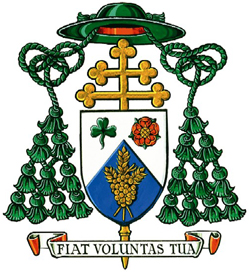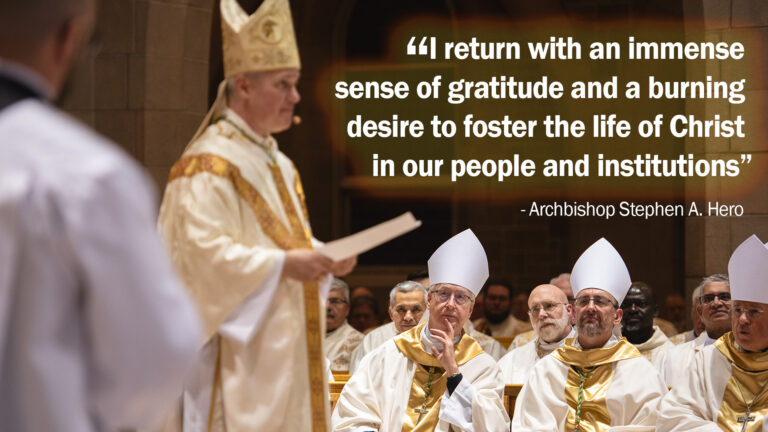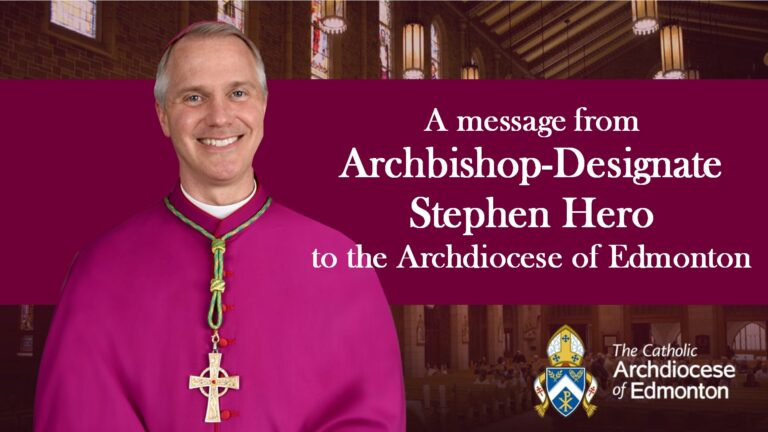Homily
[Sirach 27:30 – 28:7; Psalm 103; Romans 14:7-9; Matthew 18: 21-35]
It has been an eventful last number of months for the people of Edson and surrounding area, to say the least. Fire and floods, terrible loss, and evacuations – twice. You have certainly been in my heart and prayers, as well as those of the people of the Archdiocese, and I am glad finally to have the occasion to visit and celebrate the Eucharist together with you.
The damage and displacement you endured was also felt by many others here in the West and elsewhere in the country due to dangerous climatic conditions, but not by everyone. Many were not threatened by wildfires or floods. Our Scripture readings today, though, speak of a damage and displacement experienced by all people at some point in their lives, often more than once, that flow from destructive forces in the environment of our relationships.
When we are hurt – emotionally or physically – by people we love or trust, that damages the soul. It causes a real displacement, in the sense that peace gets evacuated from the heart. While re-building damaged property can be done, we wonder if recovery from injury to the heart, especially if the hurt is deep, can ever happen. Peace is displaced by burning anger, and abiding resentment scars my inner life far more deeply than the scorched earth alongside our roads.
Those who were evacuated from their properties during the fires waited attentively for official word directing movement. At first it was the word to leave, and by all accounts the response was orderly. Then they eagerly listened for word from officials that they could begin the journey back home. I can imagine that was a very welcome call when it was issued. When a word of hurt is spoken to us, the response is far from orderly; it brings about an internal chaos of emotions. Rather than move, we can allow those responses, such as bitterness, to keep us rooted in place. In the Gospel, Jesus announces a word, summoning us to move out of our anger and resentment and return home to peace of heart. However, this announcement is often not readily welcomed at all. The word he speaks is “forgive”.
We are very familiar with the dialogue between Jesus and Peter, who wonders how often we should forgive those who hurt us. The Lord’s answer is well-known: “seventy-times seven”. In other words, our willingness to forgive must be limitless – as often as we are hurt, forgive. Clearly, this is not always easy. Some hurts are so grievous that it is beyond our natural ability not to feel the pain. I can re-build my house or shop, but I cannot on my own restore my life by forgiving what was done to me or to someone else that I love.
What to do? In this community impacted by the fires and floods, there would be many instances, I am sure, of people who received a lot of assistance from others. When we have been helped, and know how much we depended upon it, the natural reaction is to want to help others if they go through the same pain. When it comes to forgiveness, Jesus calls us to consider how we have received forgiveness from Almighty God when we sinned, how God came to our rescue with his mercy, and summons us to be ready to extend that same help, that same forgiveness, to others when they have hurt us. This is the point of the parable, in which a king forgives a slave an enormous debt, only to learn that the one forgiven refused to release another person from an infinitely smaller sum he was owed. Having received mercy, we must be ready to extend mercy. God’s mercy is infinite, so our readiness to forgive others must be without limit.
Furthermore, Jesus warns us that there is no getting around forgiving others if we ourselves want to be forgiven by God. During the fires here and elsewhere there were many roadblocks on our highways, with occasional stories of people trying to get around them somehow in order to get home, but were turned back. To get home to peace of heart, that roadblock formed by unwillingness to forgive must be taken away. Only then will the path open that gives access to God’s mercy and directs us forward to the forgiveness of others.
Here in the Eucharist, grace is given to remove the roadblock. Let’s remember that the unbounded mercy of God was fully displayed on the Cross of our Lord. There Jesus asked the Father for forgiveness of those who were inflicting upon him unspeakable agony as they put him to death. Through his resurrection, that divine power of forgiveness gushed forth into the world not only for the Lord’s tormentors but also for all sinners, no matter how grievous the offence. That same mercy pours forth upon us now as we celebrate the mass, where the self-offering of Christ on the Cross is made present on the altar. Let us bring to the altar, then, any pains or hurts we are harbouring, and ask the Lord to grant us the grace to forgive. Only in this way will the roadblock of bitterness be removed so that peace and freedom can make their way back home to our hearts.
Most Reverend Richard W. Smith
Sacred Heart Parish, Edson
September 16-17, 2023



